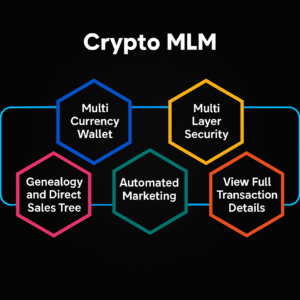
Bitcoin Transaction Fees are a crucial aspect of the cryptocurrency ecosystem, influencing the speed and cost of transactions. As Bitcoin gains more users and applications, understanding what affects these fees becomes increasingly important. These fees are crucial for the Bitcoin Network functionality, especially given the limited block size and the competitive nature of the blockchain. Transaction fees fluctuate based on network demand and other influencing factors.
What is Bitcoin Transaction Fee?
Bitcoin Transaction Fees are charges incurred for Processing and Confirming Transactions on the Bitcoin network. These fees play a crucial role in ensuring that transactions are included in the blockchain in a timely manner. When users make transactions, they attach a fee to incentivize miners, who validate and add the transactions to the blockchain. For a Blockchain Development Company, optimizing Bitcoin transaction fees is essential for developing efficient solutions and managing costs effectively.
The higher the fee, the more likely it is that a miner will prioritize the transaction for inclusion in the next block. The fee amount is determined by several factors, including the transaction size in bytes and the current demand for block space. As the Bitcoin network experiences higher traffic, fees can fluctuate significantly, reflecting the competition among users to secure faster transaction confirmations.
How Does Bitcoin Impact Transaction Fees?
Bitcoin’s design and protocol directly influence transaction fees, which are essential for maintaining the network’s efficiency. As Bitcoin Transactions are processed by miners, they are prioritized based on the fees attached. When the network experiences high demand, such as during periods of increased trading activity, the competition for block space intensifies. This competition drives up transaction fees, as users are willing to pay more to ensure their transactions are confirmed promptly. For companies offering Blockchain Development Services, analyzing network trends and optimizing transaction fee strategies, developers can build solutions that enhance transaction efficiency and manage costs effectively, ultimately providing a smoother experience for users.
Top Factors Affecting Bitcoin Transaction Fees
-
Network Demand
High transaction volumes increase competition for block space, leading to higher fees. When many transactions are waiting to be processed, users must offer higher fees to ensure their transactions.
-
Transaction Size
The size of a transaction in bytes affects its fee. Larger transactions, which involve multiple inputs and outputs. Blockchain Consulting Solutions can help optimize transaction sizes to manage costs effectively.
-
Block Size Limit
Bitcoin’s Block Size limit restricts the number of transactions that can be included in a block. As blocks reach their maximum capacity, fees rise as users compete for inclusion.
-
Fee Estimation Tools
Various tools and services provide estimates for optimal transaction fees based on current network conditions. Utilizing these tools can help users set appropriate fees and avoid overpaying.
-
Miner Incentives
Miners are rewarded with both newly minted bitcoins and transaction fees. During periods of high network activity, miners prioritize transactions with higher fees, leading to increased costs for users.
-
Bitcoin Price Fluctuations
The price of Bitcoin can influence transaction fees. Higher Bitcoin prices may lead to increased transaction fees as users are willing to pay more to ensure timely confirmations.
Do Economic Factors Influence Bitcoin Transaction Fees?
Yes, economic factors significantly influence Bitcoin transaction fees. The broader economic environment, including Bitcoin’s Market Price and overall demand, directly impacts transaction costs. When Bitcoin prices rise, the transaction fees often increase as well, driven by higher user demand for block space and a greater willingness to pay more to expedite transactions. Conversely, during periods of lower Bitcoin prices or reduced market activity, transaction fees may decrease as competition for block space lessens.
Additionally, macroeconomic factors such as inflation or changes in regulatory policies can affect investor sentiment and transaction volume, further influencing fees. Blockchain Development Services can help address these economic fluctuations by implementing advanced strategies for fee optimization and providing solutions that adapt to changing market conditions, ensuring efficient and cost-effective transactions for users.
Tools to Estimate Bitcoin Transaction Fees
-
Bitcoin Fee Estimator Websites
Platforms like Mempool.space and BitcoinFees.net provide real-time fee estimates based on current network congestion. These tools help users determine the optimal fee for timely transaction confirmation.
-
Wallet Fee Estimation Features
Many Cryptocurrency Wallets, including Electrum and Bitcoin Core, offer built-in fee estimation tools. These features analyze the current network conditions and suggest appropriate fees for transactions, ensuring efficient processing.
-
Blockchain Tools
Professional Blockchain Consulting Services often utilize advanced analytics and fee prediction tools to provide customized fee estimates based on specific transaction needs and network trends.
-
Mining Pool Fee Estimators
Some Mining Pools provide fee estimation services, offering insights into the fees needed for transactions to be prioritized by miners, based on their own processing capabilities and network conditions.
Can Users Reduce Their Bitcoin Transaction Fees?
Yes, users can reduce their Blockchain Transaction Fees through several strategies. One effective method is to time transactions during periods of lower network congestion, when demand for block space is lower and fees are less expensive. Another approach is to optimize the size of the transaction by consolidating inputs, which reduces the overall transaction size in bytes and thus lowers the fee. Users can also utilize fee estimation tools to set an appropriate fee based on current network conditions, avoiding overpayment. Additionally, employing techniques such as batch transactions, where multiple payments are combined into a single transaction, can further reduce fees.
Why Choose Nadcab Labs to Optimize Bitcoin Fees?
Nadcab Labs, a leading Blockchain Consulting Company, offers specialized expertise in optimizing Bitcoin transaction fees. With their deep understanding of blockchain technology and extensive experience in fee management, they help clients navigate the complexities of Bitcoin transactions. They utilize advanced tools and analytics to provide tailored solutions that minimize transaction costs and enhance processing efficiency. By leveraging their insights into network dynamics and fee estimation, they ensure that clients achieve optimal fee structures, reducing costs and improving transaction speed.







